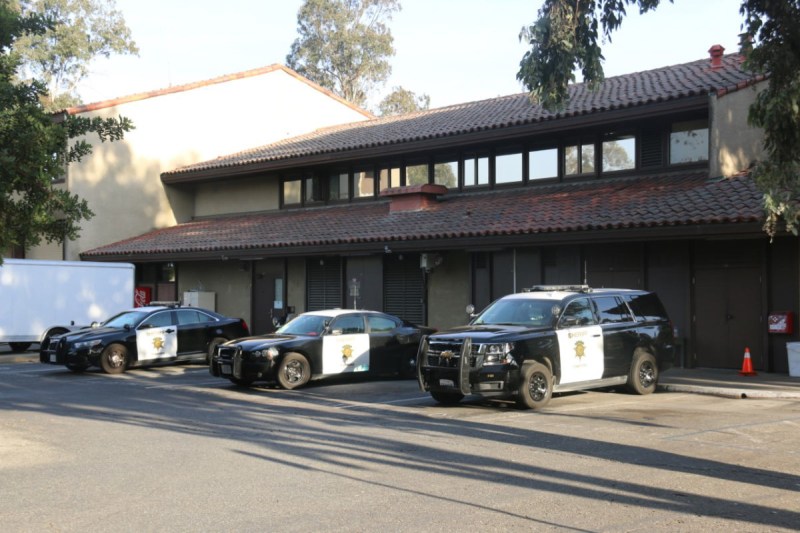Last Wednesday, the Community Board on Public Safety published a report calling for Stanford to ‘reimagine’ campus policing. The Daily summarized the Board’s findings and recommendations in a news article released the same day.
As Abolish Stanford organizers and members of the Stanford community, we did not need the Board’s report, delivered months late without notice or explanation, to confirm what we already know about policing on campus: that it is a racist, classist institution that targets people of color, criminalizes and exacerbates mental illness and poverty and protects private property at the cost of community safety and wellbeing.
What we did learn from this report, however, is that the SUDPS has been deeply misleading in denying they had access to racial profiling data that advocates have been demanding for over a year. Last summer, Black VSO leaders repeatedly met with Stanford administrators to request a racial breakdown of police stops and citations; and in August, MuckRock News submitted a California Public Records Act (CPRA) request for all data on racial profiling by SUDPS. In both instances, parties were told that such data did not exist. SUDPS’s response to the CPRA request was that such data would not be collected until Jan. 1, 2021, under the Racial and Identity Profiling Act (RIPA). Yet, the Board’s report demonstrates that SUDPS has always collected breakdowns on officer-reported racial and ethnic categories in citations, arrests and field interviews — ostensibly no different than what they would be required to report under RIPA.
This is illustrative of how campus police forces evade public accountability and how Stanford University used the Board as a means of delaying the release of critical information to the public. Campus police institutions tend to not be subject to state records laws, and thus the public — especially key constituents within the Black community — were and continue to be deprived of the opportunity to conduct these sorts of analyses themselves.
Moreover, considering the original June 1 deadline — never mind the nearly two-month delay beyond that — it is clear that this report was scheduled in a way such that it could have minimal influence on the University’s budget allocation process for the 2021-22 academic year. In mid-June, after the supposed deadline for the Board’s report but before its ultimate release, the University published its Budget Plan, allocating $24.6 million to SUDPS for 2021-22. This enormous budget is incompatible with the Board’s suggestion to decrease the scope of armed policing and undermines the University’s ability to realize the Board’s recommendation of additional funding for mental health support. (There is no mention of CAPS or mental health funding increases despite the University’s plan to fully re-open after over a year in a pandemic.)
The report also makes no recommendations regarding the Collective Bargaining Agreement between SUDPS deputies and the University. Over 200 Stanford community members signed our Day of Refusal pledge, demanding an immediate halt to police union contract negotiations. Abolish Stanford was personally bcc’ed on nearly 100 emails to President Tessier-Lavigne, Vice Provost Drell, members of the Office of General Counsel and the Community Board on Public Safety co-chairs. These concerns have gone completely unaddressed by the University and the Board, suggesting that the Board has only listened to select community concerns that align with their recommendations.
University spokesperson Dee Mostofi stated that the Board had “no connection to, or knowledge of, the University budget process,” and we can only assume the same is true for the Collective Bargaining Agreement. We wonder, then, about the purpose of harnessing the momentum and energy during the George Floyd uprisings into a Community Board on Public Safety that would leave the structure, budget and function of SUDPS entirely intact over one year later.
Despite University president Tessier-Lavigne’s claim that the Board “invested tremendous effort in hearing from the community,” students were in reality afforded only a single town hall to share their thoughts and experiences on the subject of public safety. The Board’s report neglects to note that almost every single student who spoke at that town hall championed the abolition of SUDPS; it also overtly ignores the demands of the Black community to abolish policing at Stanford. Moreover, considering SUDPS’s history of violence against surrounding communities, it is a glaring omission that the Board did not reach out to any residents of East Palo Alto or other nearby towns and neighborhoods, narrowly defining “community” as only including official Stanford affiliates. This privileged, us-vs-them framing of what constitutes “community,” and which opinions matter, is precisely what enables the violence of policing.
In assembling this report, the University was completely unresponsive to the widespread concerns that SUDPS is a perpetrator of violence and instead allowed them to sit on the Board and provide “recommendations” on how they can do better. The myth that police departments will hold themselves accountable has been widely debunked for years, and the Board’s proposal of more anti-bias and de-escalation training for officers only attempts to salvage the failing reputation of a rotten system.
The Board offers palatable suggestions, but none of their recommendations are accompanied by a convincing accountability mechanism. They are unwilling to stand behind their own analysis, which confirms the disparate over-policing experienced by community members of color. To instead mull over the data with a consultant for at least another year, before implementing any changes on the ground, is simply unacceptable. We need cops off our campus now.
Abolish Stanford
